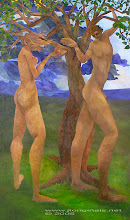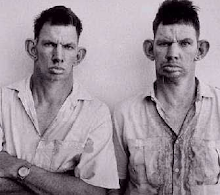The bearded Mr
Dennett says some very interesting things about free will in his excellent and highly recommended book 'Freedom Evolves'.
He thinks that
free will is only possible at all in a deterministic and therefore regular and predictable universe. He thinks that human beings have evolved to a level of consciousness (a kind of highly advanced awareness of our surroundings) that enables them to anticipate and predict different possible outcomes from different choices of action. If I duck the stone will miss my head, if I don't it will hurt: these predictions, made possible by our experience of similar events and the predictability of our deterministic world allow us to avoid events that we could not have avoided if we weren't conscious. (A football cannot avoid being kicked).
So, even though we are subject to
causation - we are part of the
causal chain - causes do not affect us in inevitably, we can avoid some effects (the stone hitting us). To describe this situation Dennett coins the term '
evitability' - the opposite of inevitability. For Dennett this gives us a kind of
free will.
This is a draft ... I'm still working on it.





























